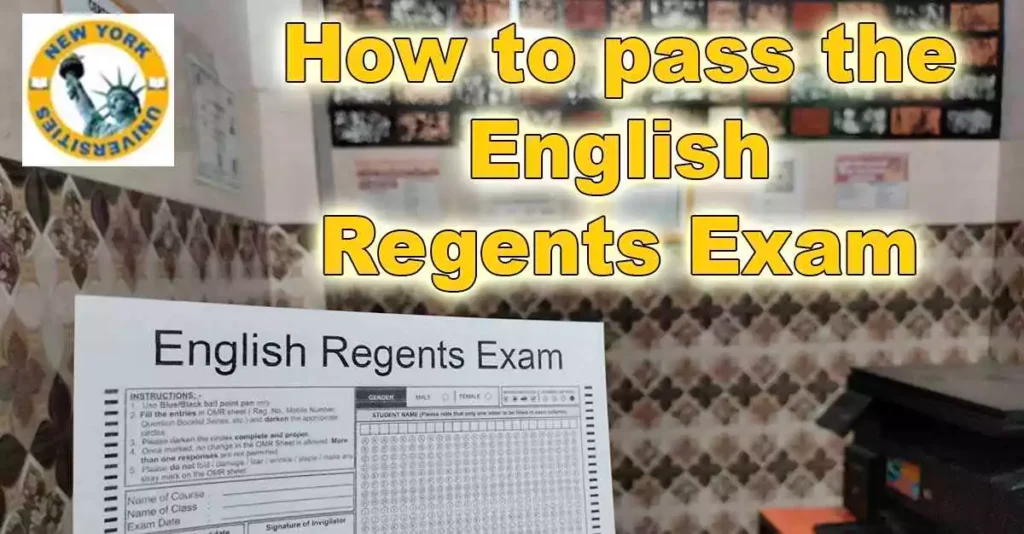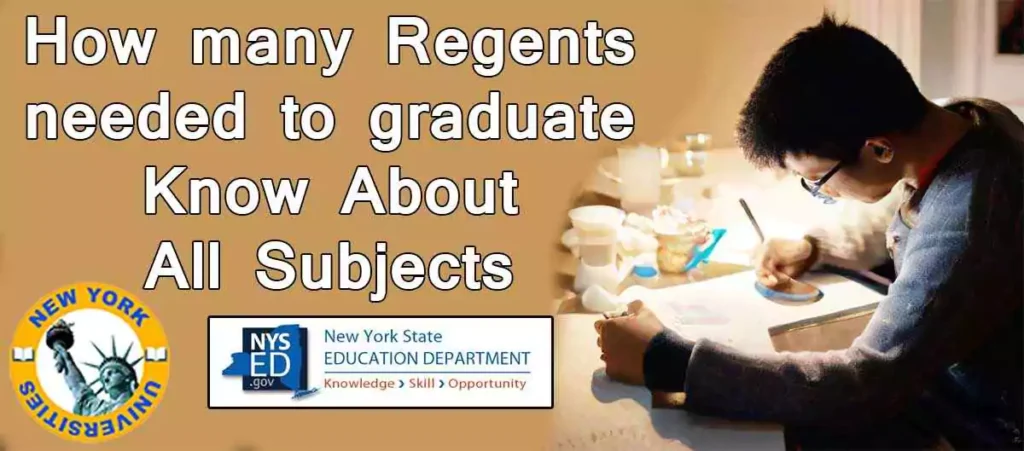Last updated on November 10th, 2024 at 09:40 am
Regents Exams are essential tests in New York State schools, having been in existence for a considerable period and evolving to align with students’ educational needs. They hold significant importance as passing them is typically a requirement for high school graduation and admission into post-secondary education. This guide will explain “What are Regents Exams in New York,” why they matter, how they work, and what they signify for students in New York.
After completing your school education in New York, whether you are admitted to an art university, a fashion university, or a community college, you will be asked about your Regents Exams before taking admission anywhere. So let’s know about it in detail
What are Regents Exams in New York State?
A few months ago, the Regents exams were held in January and we had also told you their schedule. Regents Exams are a crucial part of education in New York State, aligning with the state’s learning standards. They are crafted by teacher committees and education experts to assess student achievement and the effectiveness of teaching. These exams cover essential high school subjects and are mandatory for earning a Regents Diploma, a requirement for graduation.
Students must pass a set number of exams after completing related courses to qualify for graduation. Options like Regents with Advanced or Honors designations are available for high-achieving students, along with local diploma alternatives.
History and Evolution of Regents Exams.
Regents Exams have a long history in New York State’s education system. They were first introduced in 1865 as entrance exams for high school students, ensuring that incoming students met certain academic standards. Over a decade later, in 1878, the purpose of these exams expanded to serve as end-of-course assessments for high school students.
This shift allowed the exams to measure students’ knowledge and skills after their high school courses, setting a standard for academic achievement and readiness for further education or careers. Over the years, the exams have evolved to align with changing educational goals and standards, but their core purpose of assessing student proficiency has remained consistent.
What States Have Regents Exams?
Regents Exams are unique to New York State. While other states in the U.S. have their own standardized testing systems, none use the Regents Exam format. New York is the only state that requires these specific exams for high school graduation, setting it apart from other states in terms of assessment and academic standards.
For Example, Other states may use standardized tests such as the SAT exam, ACT, and their state-specific exams.
Why is New York the Only State with Regents Exams?
New York is the only state where Regents Exams are organized, primarily because the statewide standardized exams in New York are termed as Regents Exams. However, similar exams exist in other states, but they are known by different names.
For Example:
in Columbia, it’s called PARCC;
in Florida, it’s FSA and FSAA;
in Massachusetts, it’s MCAS, and so on.
Each state has its own designation for its statewide standardized exams. Similarly, New York State’s statewide standardized exam is known as the Regents Exams.
Do IVY League Colleges look at regents scores?
When it comes to Ivy League colleges in New York, each institution has its own unique terms and conditions for admission. Generally, Ivy League colleges review all exams taken during high school as part of their holistic admissions process. This can include a variety of standardized tests, coursework grades, and other academic achievements.
Purpose and Importance.
Purpose and Importance of Regents Exams in New York
The main goal of the Regents Exams is to test students’ knowledge and skills in important subjects. They are crucial for determining if students can graduate from high school and help evaluate how well schools are teaching.
The Regents Exams serve several important purposes in New York State’s education system. These purposes are as follows:
- Standardized Assessment: Regents Exams provide a way to measure what students know in key high school subjects consistently. This makes sure all students in the state are held to the same academic standards.
- Graduation Requirement: To earn a Regents Diploma and graduate from high school in New York, students must pass the Regents Exams. This ensures students reach a certain level of knowledge.
- College and Career Readiness: These exams help prepare students for college and careers by ensuring they have a good understanding of essential subjects. This is especially important for students planning to go to college or start working right after high school.
- Accountability: The exams make sure schools are providing a good education. Schools need to prepare students to pass these tests, which can lead to better teaching methods and curriculums.
- Identifying Areas for Improvement: By looking at Regents Exam results, educators can see where students are having trouble and work to improve those areas. This helps make overall education better.
- Uniform Standards: Regents Exams help keep education standards the same across the state, reducing differences in education quality between schools and districts.
Overall, the Regents Exams are essential for maintaining high academic standards, ensuring students are ready for their future, and improving education throughout New York State.
Can You Opt Out of Regents Exams?
Yes, you can opt out of Regents Exams under certain circumstances. In New York, students are typically required to pass at least four Regents Exams to graduate from a public high school. However, According to an existing protocol, if a student encounters challenges or obstacles closer to the exam date and wishes to opt out after applying, they can do so with the principal’s approval.
However, recent developments suggest a potential shift in this landscape. On November 13, 2024, the NYS Blue Ribbon Commission proposed significant changes to high school graduation requirements, specifically regarding the Regents Exams. The commission is contemplating making these exams optional, potentially altering the graduation criteria significantly.
While this proposal marks a significant departure from the current system, it’s crucial to note that it’s still in the discussion phase. If this proposal is implemented, you may have several ways to opt out of the Regents Exam. Until an official statement is released, the status of the Regents Exams remains unchanged. Several reputable news sources, including CBS News and The New York Times, have reported on these developments, highlighting the potential implications for high school students across the state.
(( Reference: This information was obtained through prominent news websites in the United States, such as The New York Times and CBS News. For further details, you can visit their respective websites. ))
Types of Regents Exams.
The Regents Exams are statewide standardized tests in core high school subjects in New York. These exams don’t have different types, but they cover various subjects. Each student is required to pass around five Regents Exams to meet graduation requirements. Let’s delve into the specific subjects and options available for these exams:
- Core Subjects:
- English: English Regents is an exam that assesses students’ proficiency in reading, writing, and critical thinking skills. It typically includes tasks such as reading comprehension, essay writing, and analysis of texts.
- Mathematics: The Mathematics Regents Exams in New York often include Algebra I, Geometry, and Algebra II. These tests evaluate students’ understanding of mathematical concepts, problem-solving abilities, and application of mathematical principles.
- Science: Students have options to choose from several science subjects, including Earth Science, Living Environment (Biology), Chemistry, and Physics. These exams test students’ knowledge of scientific principles, laboratory skills, and ability to apply scientific methods.
- Social Studies: This category includes exams in Global History and Geography, and United States History and Government. These tests assess students’ understanding of historical events, geographic concepts, and governmental structures.
- Fifth Regents Exam:
- The fifth exam offers flexibility, allowing students to choose an additional subject based on their interests and strengths. This could include:
- English Language: For students who wish to demonstrate further proficiency in English.
- Art: For those interested in showcasing their skills and knowledge in visual or performing arts.
- Additional Mathematics: An option for students who want to delve deeper into mathematics beyond the required courses.
- Additional History: For students interested in exploring more historical topics and themes.
- The fifth exam offers flexibility, allowing students to choose an additional subject based on their interests and strengths. This could include:
Given the diversity of subjects, the fifth Regents Exam can vary widely depending on the student’s preferences and the popularity of subjects in different cities across New York.
Structure of Regents Exams.
The Regents Exams are designed to assess high school students’ proficiency in various subjects through a standardized testing format. The structure of these exams is comprehensive, incorporating multiple parts with a variety of question types to evaluate students’ understanding and analytical abilities.
- Multiple-Choice Questions: Each exam begins with a section of multiple-choice questions. These questions test the student’s knowledge and recall of key concepts and facts. The number of multiple-choice questions varies by subject but typically ranges from 24 to 35 questions.
- Open-Ended Questions: Following the multiple-choice section, there are several parts consisting of open-ended questions. These questions require students to provide detailed answers, demonstrating their problem-solving skills and deeper understanding of the subject matter. The number of open-ended questions can vary significantly between subjects.
- Mix of Multiple-Choice and Open-Ended Questions: Some exams include sections that combine multiple-choice and open-ended questions. This mix allows for a more varied assessment of students’ abilities, requiring them to switch between different types of thinking and response formats.
- Essays and Constructive Responses: Many Regents Exams in New York include sections that require longer, written responses. These can take the form of source-based argument essays, text-analysis responses, or document-based essay questions. These sections are designed to assess students’ abilities to construct coherent arguments, analyze texts, and synthesize information from multiple sources.
Overall, the structure of the Regents Exams in New York is meticulously crafted to cover a broad spectrum of skills, from factual recall to complex analytical writing.
(( Reference: This information was obtained through an in-depth analysis of the official Regents Exams website and Wikipedia. For further details, you can visit these websites directly. ))
Scoring System of Regents Exams in New York State.
The scoring system of the Regents Exams in New York State is quite straightforward. Each subject has its own exam pattern and structure, and different questions carry different scores. Overall, the exam is scored out of 100 points. The number of correct answers determines the student’s score. The Regents Exam scores range from 0 to 100, with a passing score of 65 or higher.

The scoring is categorized into five levels:
- Level 5: Scores ranging from 85 to 100. This level indicates excellent performance.
- Level 4: Scores ranging from 76 to 84. This level indicates good performance.
- Level 3: Scores ranging from 65 to 75. This level indicates satisfactory performance, meeting the minimum passing criteria.
- Level 2: Scores ranging from 55 to 64. This level indicates a performance below the passing mark, but not the lowest.
- Level 1: Scores of 54 or below. This level is considered failing.
Understanding the scoring system is crucial for students aiming to achieve high marks on the Regents Exams. It helps them set realistic goals and focus their study efforts on areas that can significantly impact their overall score.
Impact on Graduation: How Many Regents Exams Are Needed to Graduate?
In New York, students are required to pass a minimum of five Regents Exams to qualify for graduation. To successfully pass each exam, students must score at least 65 or higher. These five Regents Exams include four core high school subjects and one additional subject.
The four core subjects typically encompass English, Mathematics, Science, and Social Studies. The fifth exam can be an additional subject chosen based on the student’s interests or educational focus, providing some flexibility in fulfilling the graduation requirements.
Conclusion.
Regents Exams are crucial in New York State, ensuring students meet standardized academic benchmarks. These exams assess knowledge in key high school subjects and are required for graduation. They help maintain high educational standards and prepare students for future success. Staying informed about potential changes to these requirements is essential for students, parents, and educators.
FAQs.
Can students retake Regents Exams if they don’t pass on the first attempt?
Yes, students have the opportunity to retake Regents Exams if they do not pass on the first attempt. Retaking exams allows students to improve their scores and meet graduation requirements.
Who is required to take Regents Exams in New York State?
Most high school students in New York State are required to take Regents Exams as part of their graduation requirements. However, specific requirements may vary depending on the student's grade level, course of study, and individual circumstances.
Thanks for your visit.
(What are Regents Exams in New York State?)
Disclaimer: This article is intended for informational purposes only. The information presented is based on current guidelines and resources available as of the publication date. Educational policies and requirements may change, so please consult official resources or educational authorities for the most accurate and updated information regarding Regents Exams.





